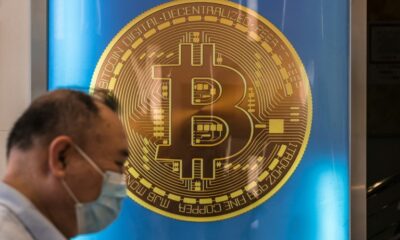US securities regulators gave the green light Wednesday to a group of bitcoin exchange-traded funds, a keenly anticipated decision expected to boost the cryptocurrency.
Regulators approved proposals for 11 ETFs to list on leading exchanges including the New York Stock Exchange “on an accelerated basis,” the Securities and Exchange Commission said in a 22-page order.
ETFs are traded on public markets, granting investors exposure to price movements in asset prices without taking direct ownership of the underlying assets.
The funds themselves, however, do invest in the digital currency.
The authorization of the ETFs or ETPs (exchange-traded products) — which are comparable to stocks or mutual funds as far as accessibility to everyday investors — “represents a pivotal juncture for the digital asset space, signifying a movement towards mainstream legitimacy and acceptance,” said Thomas Tang, vice president of investments at Ryze Labs.
“Bitcoin ETFs, by virtue of their existence within a regulated framework, will infuse a level of institutional credibility into the realm of digital assets,” Tang said.
Initially launched in the 1990s, ETFs took off in the early 2000s by investors looking for a simple and low-cost way to take bets on stock indices, commodities or a particular industrial sector.
Some $6.7 trillion were held globally in ETFs at the end of 2022, according to consultancy Oliver Wyman.
Until Wednesday, investors seeking to invest in bitcoin had to open an account on a cryptocurrency exchange and transact through a traditional medium of exchange, such as the dollar.
Wednesday’s action opens up trading on vehicles offered by mainstream financial houses such as Fidelity and BlackRock.
Near 2250 GMT, bitcoin prices were up 1.4 percent at $46,576.
– Regulatory pivot –
Anticipation of the SEC’s approval had in recent weeks jolted a digital currency already known for volatility.
On Tuesday, bitcoin prices reached a 22-month high of $47,914 after a fabricated SEC post on the X platform, formerly Twitter, said the agency had approved the listing.
But minutes after the false statement, SEC Chairman Gary Gensler took to his own X account to warn that the market regulator’s account had been “compromised” and that an “unauthorized tweet” had been posted there.
The SEC had blocked similar investment vehicles in the past.
But the agency changed its approach after a US court ruling determined the SEC had failed to adequately explain its reasoning for denying an ETF from Grayscale.
Citing the court ruling, Gensler concluded “the most sustainable path forward is to approve the listing and trading of these spot bitcoin ETP shares,” he said in a statement released by the agency.
Gensler emphasized that Wednesday’s actions included some key protections for investors, including disclosure requirements on listed ETFs.
The products will also be listed on regulated exchange, which “are required to have rules designed to prevent fraud and manipulation,” Gensler said.
While Gensler said the SEC is “merit neutral” on investments, he noted that underlying assets in metals ETFs have consumer and industrial uses, while bitcoin is “in contrast bitcoin is primarily a speculative, volatile asset” that has been used for money laundering and other illicit activity.
“While we approved the listing and trading of certain spot bitcoin ETP shares today, we did not approve or endorse bitcoin,” he said. “Investors should remain cautious about the myriad risks associated with bitcoin and products whose value is tied to crypto.”
Representative Patrick McHenry, a Republican from North Carolina who chairs the House Financial Services Committee, welcomed the announcement.
“We are pleased that investors and our markets will finally be afforded greater access to this generational technology,” said the congressman.

 Business4 months ago
Business4 months ago
 Business5 months ago
Business5 months ago
 Events3 months ago
Events3 months ago
 People4 months ago
People4 months ago
 Events6 months ago
Events6 months ago
















